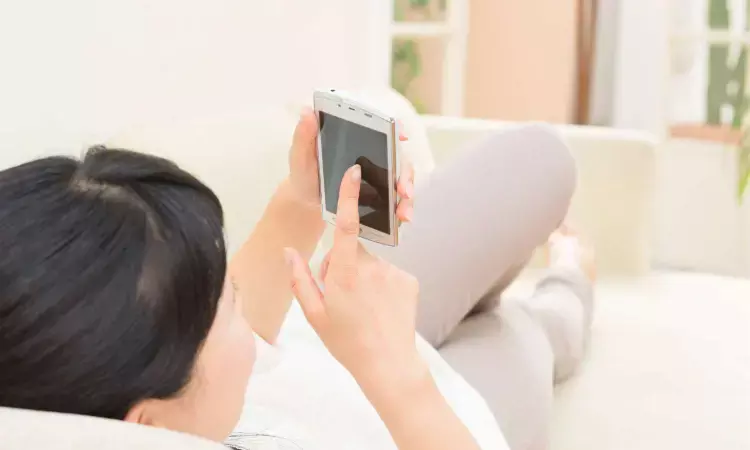- Home
- Medical news & Guidelines
- Anesthesiology
- Cardiology and CTVS
- Critical Care
- Dentistry
- Dermatology
- Diabetes and Endocrinology
- ENT
- Gastroenterology
- Medicine
- Nephrology
- Neurology
- Obstretics-Gynaecology
- Oncology
- Ophthalmology
- Orthopaedics
- Pediatrics-Neonatology
- Psychiatry
- Pulmonology
- Radiology
- Surgery
- Urology
- Laboratory Medicine
- Diet
- Nursing
- Paramedical
- Physiotherapy
- Health news
- Fact Check
- Bone Health Fact Check
- Brain Health Fact Check
- Cancer Related Fact Check
- Child Care Fact Check
- Dental and oral health fact check
- Diabetes and metabolic health fact check
- Diet and Nutrition Fact Check
- Eye and ENT Care Fact Check
- Fitness fact check
- Gut health fact check
- Heart health fact check
- Kidney health fact check
- Medical education fact check
- Men's health fact check
- Respiratory fact check
- Skin and hair care fact check
- Vaccine and Immunization fact check
- Women's health fact check
- AYUSH
- State News
- Andaman and Nicobar Islands
- Andhra Pradesh
- Arunachal Pradesh
- Assam
- Bihar
- Chandigarh
- Chattisgarh
- Dadra and Nagar Haveli
- Daman and Diu
- Delhi
- Goa
- Gujarat
- Haryana
- Himachal Pradesh
- Jammu & Kashmir
- Jharkhand
- Karnataka
- Kerala
- Ladakh
- Lakshadweep
- Madhya Pradesh
- Maharashtra
- Manipur
- Meghalaya
- Mizoram
- Nagaland
- Odisha
- Puducherry
- Punjab
- Rajasthan
- Sikkim
- Tamil Nadu
- Telangana
- Tripura
- Uttar Pradesh
- Uttrakhand
- West Bengal
- Medical Education
- Industry
Reduced screen time in families may improve behavioral and psychological symptoms in children: JAMA

A new study found that a brief reduction in the screen time during leisure period in families had a significant impact on the psychological symptoms in children and adolescents by reducing internalizing behavioral problems and prosocial behavior. The key findings of this study were published in the most recent issue of the Journal of American Medical Association.
Many observational studies have linked worse mental health of adolescents to excessive screen media use. Yet, there was not enough experimental data to support this theory. Therefore, Jesper Schmidt-Persson and colleagues carried out this study to ascertain the impact of a two-week screen media reduction strategy on the mental health of children and teenagers.
A total of 89 families from 10 Danish towns in the Southern Denmark region participated in a cluster randomized clinical trial with a 2-week follow-up. Every study technique was completed at the the homes of participants. The period of enrollment was from June 6, 2019 to March 30, 2021. These families were randomized to either the control group or the screen media reduction group. The individuals who were assigned to the intervention group required to give up their cellphones and tablets and limit their usage of screen media during leisure time to no more than 3 hours per week.
The primary results were determined by utilizing the Strengths and issues Questionnaire during the 2-week follow-up. The outcomes between-group average variance was the change in overall behavioral issues. Mixed-effects to bit regression models were utilized for the estimation of results, with intention to treat and analyses of full case were performed.
A statistically significant between-group mean difference in the total difficulties score was observed in the sample of 89 families, this comprised a total of 181 adolescents and children. This difference was in favor of the screen media reduction intervention. The prosocial behavior and internalizing symptoms showed the most gains.
Overall, this secondary analysis of the randomized clinical trial demonstrated that the behavioral challenges and strengths of children and adolescents can be positively impacted. This is only possible when the whole family (parents, kids and teenagers) cut back on their leisure-time screen media use for two weeks.
Source:
Schmidt-Persson, J., Rasmussen, M. G. B., Sørensen, S. O., Mortensen, S. R., Olesen, L. G., Brage, S., Kristensen, P. L., Bilenberg, N., & Grøntved, A. (2024). Screen Media Use and Mental Health of Children and Adolescents. In JAMA Network Open (Vol. 7, Issue 7, p. e2419881). American Medical Association (AMA). https://doi.org/10.1001/jamanetworkopen.2024.19881
Neuroscience Masters graduate
Jacinthlyn Sylvia, a Neuroscience Master's graduate from Chennai has worked extensively in deciphering the neurobiology of cognition and motor control in aging. She also has spread-out exposure to Neurosurgery from her Bachelor’s. She is currently involved in active Neuro-Oncology research. She is an upcoming neuroscientist with a fiery passion for writing. Her news cover at Medical Dialogues feature recent discoveries and updates from the healthcare and biomedical research fields. She can be reached at editorial@medicaldialogues.in
Dr Kamal Kant Kohli-MBBS, DTCD- a chest specialist with more than 30 years of practice and a flair for writing clinical articles, Dr Kamal Kant Kohli joined Medical Dialogues as a Chief Editor of Medical News. Besides writing articles, as an editor, he proofreads and verifies all the medical content published on Medical Dialogues including those coming from journals, studies,medical conferences,guidelines etc. Email: drkohli@medicaldialogues.in. Contact no. 011-43720751


